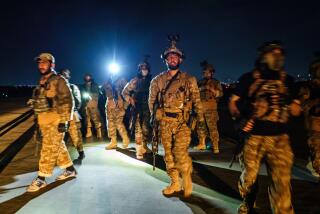General Sees Cause to Keep Coalition Size
- Share via
BAGRAM AIR BASE, Afghanistan — The incoming commander of coalition forces in Afghanistan said Thursday that remnants of Al Qaeda and Taliban leadership are still in the country and that he doesn’t believe the allied presence should be scaled back.
Rejecting the notion that the military mission in Afghanistan is nearing completion, Lt. Gen. Dan McNeill said the war effort in many ways is entering a more complex and difficult phase that will require an ongoing commitment of substantial resources from the United States and its allies.
“We have scattered the enemy, we have given the enemy a good chance to see what our capabilities are,” the U.S. Army three-star general said in an interview with The Times. “He’ll work hard to avoid our strength” and not become an easy target for coalition forces.
“That will compel us to work considerably harder to do the basic things you have to do in this fight,” McNeill said.
Asked whether the size of the coalition deployment in Afghanistan--about 13,000 troops--is out of proportion to the demands of the small border skirmishes that have characterized the war in recent months, McNeill said flatly, “I don’t think we have too much.”
McNeill, who was scheduled to assume control of the war effort today, expressed concern that increasing tensions between Pakistan and India could hamper the war effort against the Al Qaeda terrorism network and the Taliban.
But he also suggested that his tenure could mark growing cooperation with Pakistan in an effort to apprehend Al Qaeda fighters seeking refuge there.
“It’s not out of the realm of possibility that we could work outside the Afghan border,” McNeill said of the coalition forces, though he added that such decisions are a diplomatic matter “beyond my purview.” In recent weeks, small groups of coalition soldiers have joined government troops in Pakistan searching for Al Qaeda operatives.
McNeill said one of his first orders of business will be to determine whether the coalition has “the right pieces and parts” for a war that increasingly centers on guerrilla tactics rather than conventional battles.
But his remarks represent a clear signal that the U.S. is not contemplating even a partial pullback from a country that has been rid of all but fragments of Al Qaeda and the deposed Taliban regime.
McNeill said he does not know the whereabouts of Osama bin Laden and Taliban leader Mullah Mohammed Omar or whether they are alive. But the general said other Al Qaeda and Taliban figures remain in Afghanistan, eager to regroup.
In fact, McNeill said he expects key allies to continue contributing large numbers of troops to the coalition. The U.S. plans to rotate troops into and out of the region without significantly reducing the size of its force.
“My expectation would be that coalition forces would want to do the same thing,” he said of U.S. allies. “I think that’s important for a global war on terrorism.”
In particular, McNeill said he is hopeful that Britain will replace nearly 1,600 troops scheduled to leave the region at the end of June. The British government has not yet indicated whether it will do so, but many expect its decision to hinge on whether the U.S. presses for Britain’s continued involvement.
British troops have played a leading role in several recent operations. For instance, hundreds of British troops were deployed this week to patrol the Khowst region near the Pakistani border. But there also has been some opposition within Britain to extending the nation’s commitment to the war.
The chief of Britain’s defense staff, Adm. Michael Boyce, visited Bagram air base, north of Kabul, the Afghan capital, on Thursday and said the Khowst deployment “may well turn out to be the last” mission for the current contingent of British troops. But he did not say whether they would be replaced.
McNeill takes command at a fragile moment in Afghanistan. The country is preparing for a loya jirga, or grand council, that will meet in less than two weeks to select a new transitional government. U.S. officials have expressed concern that Al Qaeda or Taliban loyalists will try to disrupt the process with terrorist strikes.
McNeill said that he is not aware of specific threats and that the U.S. will play no formal role in providing security for the loya jirga, which convenes June 10. But he said coalition forces will continue to conduct operations around the country and patrol Afghanistan’s border with Pakistan.
Rising tensions in the Kashmir region “could cause some difficulties” for allied efforts as Pakistan moves soldiers from the Afghan border toward the frontier with India, McNeill said. But he stressed that Pakistan continues to be a key and cooperative partner in the war on terrorism.
McNeill, commander of the 18th Airborne Corps at Ft. Bragg, N.C., is the first U.S. military leader in the region with authority over virtually all elements of the operation. He reports to Gen. Tommy Franks, who heads the Central Command in Tampa, Fla.
More to Read
Sign up for Essential California
The most important California stories and recommendations in your inbox every morning.
You may occasionally receive promotional content from the Los Angeles Times.













